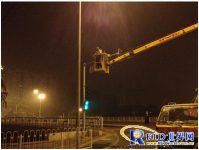
Demonstration project of intelligent management of street lamps and municipal components in Dongcheng District, Beijing
[ad_1]
As the capital, urban lighting plays an irreplaceable role in all aspects of Beijing’s municipal management, including citizens’ daily travel, urban landscape, and safety emergency. In Beijing’s “Twelfth Five-Year Plan”, the municipal government clearly takes “improving urban management” as one of the five key tasks, and also points out that it is necessary to “promote the research and development and demonstration applications of the Internet of Things and cloud computing, strengthen the Network’s information value-added service capabilities”.
By the end of 2010, the six districts of the main city of Beijing managed by the Beijing Street Lamp Management Center had nearly 210,000 street lamps, 140,000 lamp poles, 140,000 street lamp wells, and 2,027 monitoring terminals and street lamp high-voltage equipment.
In order to improve the effective management of the integrity and normal operation of Beijing’s urban lighting facilities, in June 2011, Beijing Tianyi Zhonghe Technology Co., Ltd.RFIDThe project is based on active RFID technology, integrates a variety of Internet of Things technologies and digital city technologies, and provides accurate, agile and efficient monitoring and management of municipal management objects.
At present, the company has built 320 RFID base stations in Dongcheng District, Beijing (14 road sections in the former Chongwen District, within a range of about 17 square kilometers), and installed 1,200 manhole cover identification cards and 1,300 light pole identification cards nearby to realize illegal manhole covers. The system automatically alarms and dispatches the function of emergency when it is turned on, the light pole is tilted, the lighting is abnormal, etc. Since 2011, the project has been implemented in two phases, with active perception and real-time monitoring of a total of 2,500 municipal components. To this end, Tianyizhonghe has developed a secondary development on the basis of “Metrolink” to realize the management of street lights. The central work order system docking requirements shorten the response time of event dispatch processing, standardize the functional process of job disposal, and improve the refined and intelligent management level of municipal components.

[ad_2]



